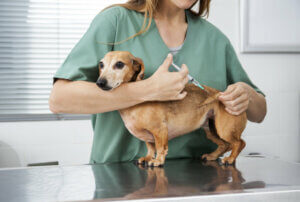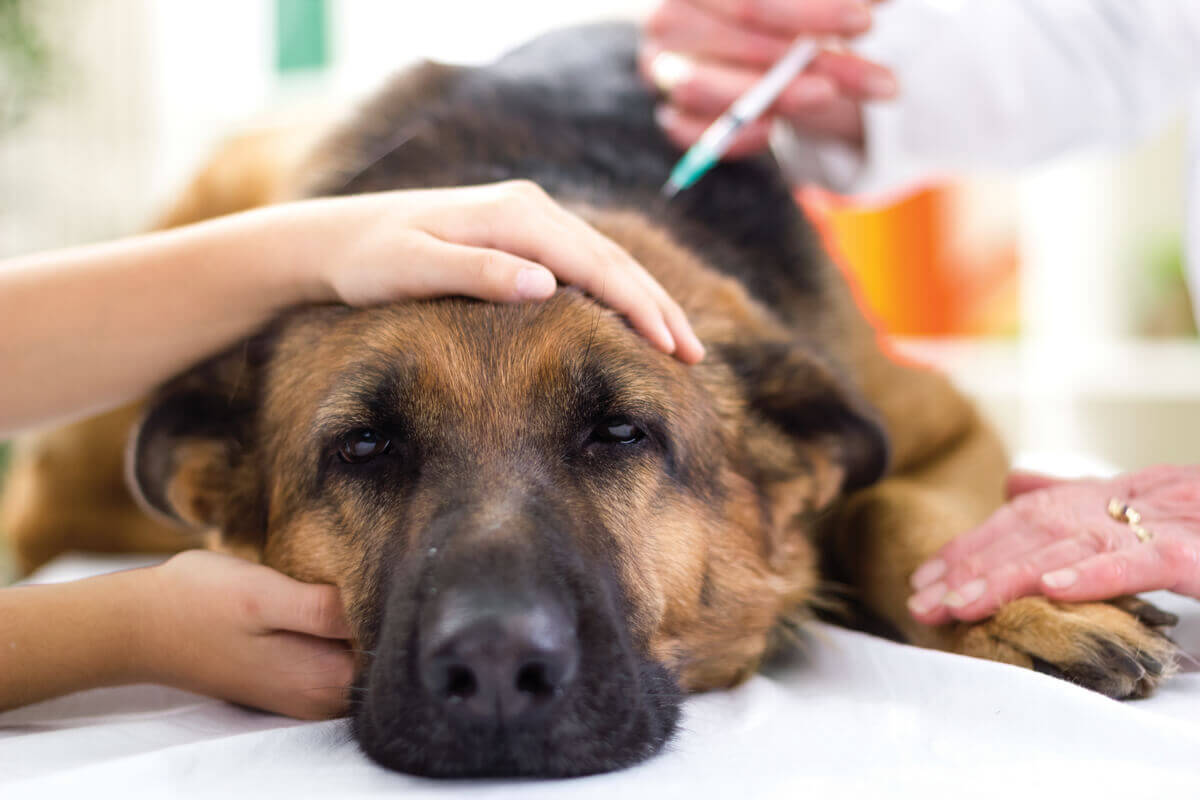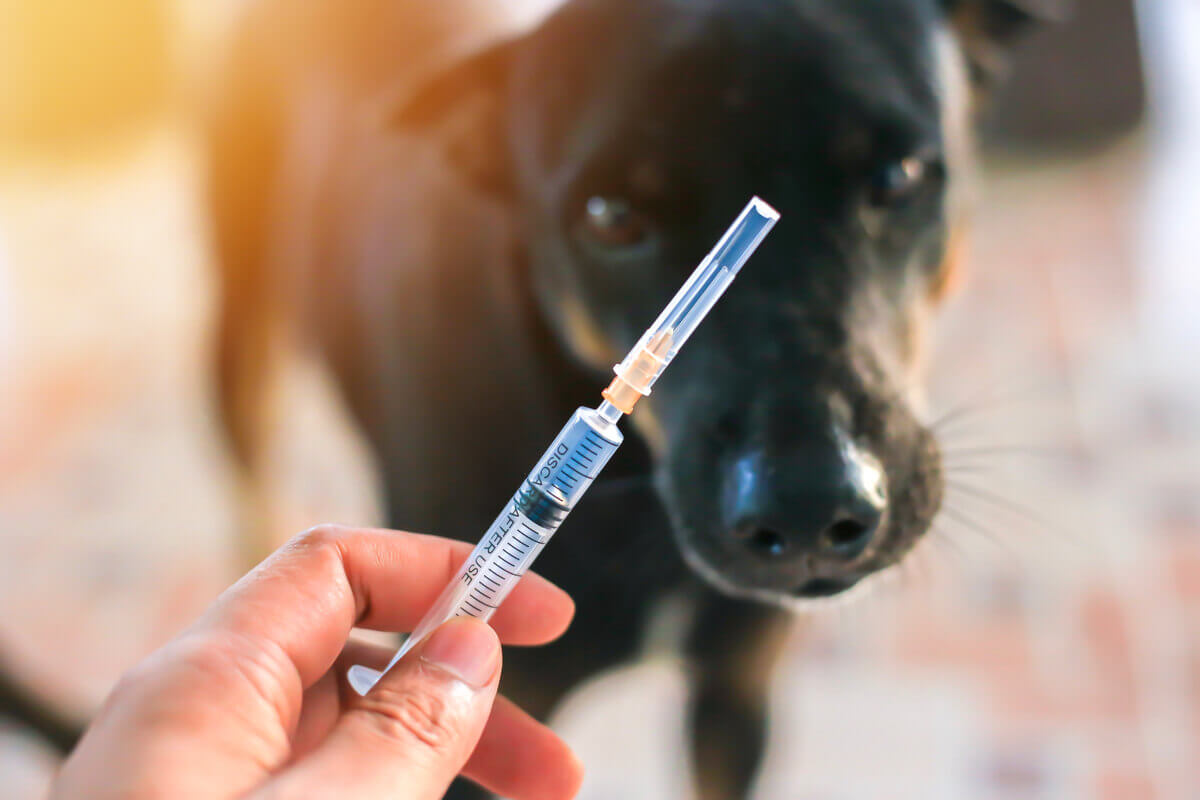Dog Vaccinations: Which Ones Do They Need?

Dog vaccinations are the most effective way to prevent the different diseases that can affect your pet. In addition, they’re a safe method with a very low probability of side effects.
For both dogs and cats, there’s a vaccination calendar that your vet will usually inform you of the first time you go with your pet. This calendar includes vaccines for the most common diseases that affect dogs and cats–some of which can be very serious.
What to do before vaccinating a dog?
Newborn puppies acquire immunity through lactation, from colostrum–the mother’s first milk. Because of this, it’s very important not to separate puppies from their mother prematurely. In addition to possible illnesses, early separation can also lead to certain behavioral problems.
At about six weeks of age, maternal immunity ends and the pups usually arrive at their new homes between this and the eighth week of life. At this time, the dog’s health is in the hands of its owners.

Infectious diseases have an incubation period from the time the pathogen enters the body until the first symptoms are shown. But this doesn’t mean that the carrier isn’t contagious during this phase.
During this period, the disease-causing microorganism multiplies and the body releases it through urine, feces, and mucus. This is the main time when the disease is contagious, so it’s important to be cautious before introducing the new pet to its peers.
For the vaccine to be as effective as possible, the dog must be totally healthy and dewormed. For example, worm infections are common in puppies that don’t go through this process.
Common diseases in dogs
You can find more vaccines on veterinary sites, but the most common ones, and those that are always present in the dog’s vaccination calendar, are the following:
- Distemper
- Parvovirosis
- Hepatitis
- Leptospirosis
- Rabies
- Leishmaniasis
- Flu or kennel cough
The first five are the most common dog vaccinations. They are for quite serious diseases that can become fatal for the animal at a very young age.
The vaccine for leishmaniasis is especially important for dogs living in areas with a high prevalence of phlebotomine mosquitoes. At the same time, the vaccine for kennel cough is important when the animal is going to spend time in contact with many more dogs, such as in a kennel.
When to start vaccinating
At six weeks of age, the owner can start vaccinating the dog. The first vaccines are usually against parvovirus and distemper, which have a re-vaccination dose three to six weeks later.
Along with the re-vaccination of the previous ones, dogs also receive doses of the hepatitis and leptospirosis vaccines. All these diseases are contained in a single vaccine, which needs annual re-vaccination in order for the animal to acquire immunity.
When the puppy turns three months old, it will need vaccination against rabies. This, in addition to a booster dose per month, also requires mandatory annual re-vaccination – depending on the country and community where it lives.
After the age of 6 months, dogs can receive the vaccine for leishmaniasis. Moreover, it can be complemented with the use of external antiparasitics to prevent both the insect bite and the development of leishmania. This is because the antibodies that the vaccine produces act when the parasite succeeds in penetrating the organism.

Why is it important to vaccinate?
All these vaccines are administered as an injection in the dog’s skin, except for the kennel cough vaccine, which is administered intranasally. They’re painless for the animal and ensure that there’s a very high probability that the pet won’t develop the diseases they’ve been vaccinated for.
For the act of vaccination to be effective, the instructions of the veterinarian should be followed, the vaccination schedule of the dog should be kept up to date. What’s more, dogs should be re-vaccinated when necessary, in order to obtain a protective level of antibodies.
Dog vaccinations are the most effective way to prevent the different diseases that can affect your pet. In addition, they’re a safe method with a very low probability of side effects.
For both dogs and cats, there’s a vaccination calendar that your vet will usually inform you of the first time you go with your pet. This calendar includes vaccines for the most common diseases that affect dogs and cats–some of which can be very serious.
What to do before vaccinating a dog?
Newborn puppies acquire immunity through lactation, from colostrum–the mother’s first milk. Because of this, it’s very important not to separate puppies from their mother prematurely. In addition to possible illnesses, early separation can also lead to certain behavioral problems.
At about six weeks of age, maternal immunity ends and the pups usually arrive at their new homes between this and the eighth week of life. At this time, the dog’s health is in the hands of its owners.

Infectious diseases have an incubation period from the time the pathogen enters the body until the first symptoms are shown. But this doesn’t mean that the carrier isn’t contagious during this phase.
During this period, the disease-causing microorganism multiplies and the body releases it through urine, feces, and mucus. This is the main time when the disease is contagious, so it’s important to be cautious before introducing the new pet to its peers.
For the vaccine to be as effective as possible, the dog must be totally healthy and dewormed. For example, worm infections are common in puppies that don’t go through this process.
Common diseases in dogs
You can find more vaccines on veterinary sites, but the most common ones, and those that are always present in the dog’s vaccination calendar, are the following:
- Distemper
- Parvovirosis
- Hepatitis
- Leptospirosis
- Rabies
- Leishmaniasis
- Flu or kennel cough
The first five are the most common dog vaccinations. They are for quite serious diseases that can become fatal for the animal at a very young age.
The vaccine for leishmaniasis is especially important for dogs living in areas with a high prevalence of phlebotomine mosquitoes. At the same time, the vaccine for kennel cough is important when the animal is going to spend time in contact with many more dogs, such as in a kennel.
When to start vaccinating
At six weeks of age, the owner can start vaccinating the dog. The first vaccines are usually against parvovirus and distemper, which have a re-vaccination dose three to six weeks later.
Along with the re-vaccination of the previous ones, dogs also receive doses of the hepatitis and leptospirosis vaccines. All these diseases are contained in a single vaccine, which needs annual re-vaccination in order for the animal to acquire immunity.
When the puppy turns three months old, it will need vaccination against rabies. This, in addition to a booster dose per month, also requires mandatory annual re-vaccination – depending on the country and community where it lives.
After the age of 6 months, dogs can receive the vaccine for leishmaniasis. Moreover, it can be complemented with the use of external antiparasitics to prevent both the insect bite and the development of leishmania. This is because the antibodies that the vaccine produces act when the parasite succeeds in penetrating the organism.

Why is it important to vaccinate?
All these vaccines are administered as an injection in the dog’s skin, except for the kennel cough vaccine, which is administered intranasally. They’re painless for the animal and ensure that there’s a very high probability that the pet won’t develop the diseases they’ve been vaccinated for.
For the act of vaccination to be effective, the instructions of the veterinarian should be followed, the vaccination schedule of the dog should be kept up to date. What’s more, dogs should be re-vaccinated when necessary, in order to obtain a protective level of antibodies.
All cited sources were thoroughly reviewed by our team to ensure their quality, reliability, currency, and validity. The bibliography of this article was considered reliable and of academic or scientific accuracy.
- Merck & CO., INC. El manual Merk de veterinaria. Barcelona, Océano Grupo Editorial, 2000.
- Fidalgo, L. E., Rejas, J., Ruiz de Dopegui, R., Ramos, J. J. Patología Médica Veterinaria. Salamanca, Kadmos, 2003.
This text is provided for informational purposes only and does not replace consultation with a professional. If in doubt, consult your specialist.








